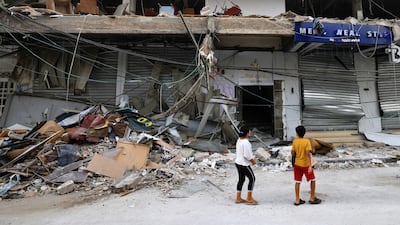Live updates: Follow the latest news on Israel-Gaza
The war between Israel and Gaza, and the slowdown in the Chinese economy are posing near-term risks to the world's financial system and stock markets, the US Federal Reserve has said.
The tensions are considered “important risks” to global economic activity, and include the possibility of sustained disruptions to regional trade in food, energy and other commodities, the US central bank said in its semi-annual Financial Stability Report on Friday.
Crucially, any escalation of these conflicts or a worsening in other geopolitical tensions could reduce economic activity and boost inflation worldwide – two worries that already have adverse effects globally – it said.
“The attack on Israel, in conjunction with Russia’s continuing war against Ukraine, has ratcheted up geopolitical tensions,” the Fed said.
“Unexpected persistence in inflation from any source could prompt upwards revisions to the path of policy rates. A sharp increase in rates could lead to heightened volatility in financial markets, stresses to market liquidity and an adjustment in asset prices.”
A further slowdown in Chinese economic growth, meanwhile, could worsen financial stresses already being experienced in the world's second-largest economy and strain stock markets globally, the report said.
Any stresses originating from China could spill over to emerging markets, especially those that are dependent on Chinese trade or on credit provided by Chinese entities, it said.
Many Chinese companies are struggling to service very high debt burdens, especially in the property sector, and local governments are also facing increasing fiscal strains.
“The spillovers could result in significant capital outflows from emerging market economies, where generally heightened debt levels may make these economies more susceptible to external shocks,” the Fed said.
“Given the size of its economy and financial system, financial stresses in China also could strain global markets more broadly through disruptions to economic activity, deterioration of risk sentiment and possibly a sharp appreciation of the dollar.”
The Israel-Gaza war, which the UN said has turned into a humanitarian crisis, is at the forefront of everyone's mind and mentioned in almost every economic press briefing.
Economists are already hurrying to reconfigure their risk assessment models as they try to re-evaluate their economic forecasts to reflect the impact of this unprecedented escalation between Israel and Hamas, which rules Gaza.
Bloomberg economists see the global economy at risk of recession if the conflict drags out and other countries also getting involved in the war that could push oil prices to near $150 per barrel.
For Israel, the economic cost of the conflict could run up to at least 27 billion shekels ($6.7 billion), according to estimates by Tel Aviv-based Bank Hapoalim, the country's largest lender by credit to the public.
“The global financial system could be affected by a pullback from risk-taking, declines in asset prices and losses for exposed businesses and investors,” the Fed report said.
The Fed is also concerned with energy prices, which have increased in recent months, leading to renewed cost pressures that businesses might pass on to their customers.
Oil prices reversed earlier gains to settle lower on Friday, but still notched their second straight weekly increase amid concerns that the Israel-Gaza war may escalate into a regional conflict that could disrupt crude supplies.
Brent declined 0.24 per cent, or $0.22, to close at $92.16, while West Texas Intermediate shed 0.69 per cent, or $0.62, to settle at $88.75.
Stock markets have also felt the effects of the continuing conflict, with equities falling further at the close of trading on Friday.
The war has added to other concerns facing investors, which include high interest rates and elevated inflation, which the Fed and other central banks are trying to contain.
“High interest rates in foreign economies, particularly if they persist, could negatively affect the debt servicing capacity of households, businesses, and governments abroad,” the Fed said.



